| |
|
|
 |
|
Ethiopia,
Norway, Horte, Rastafari and Reggae Music
The
small Naval town of Horten at the west side of the Oslo fiord
is a growing centre of reggae music in Norway. The rastafarians
have shown great interest in visiting Horten.
For a very special reason.
Horten has hosted big reggae events since 1976, and Bob Marley
and the Wailers visited the town in 1978!
How come that this small and anonymous place has taken this unique
position in reggae music?
To find that out we have to go some years back in history.
During the last years we´ve received meny
questions about Haile Selassie and his relationship to Horten
and Norway. We have gathered some information and the historical
background. We will come up with more gradually.
In
Africa there were two countries that were never "colonized",
Liberia and Ethiopia. This story is concerning Ethiopia.
Italy tried it first, in 1896. The battle took place in Adowa
in the province of Tigray. The Ethiopians won.
This was a unique event at that time, the proud mountain-people
won against A superior force.
The event is still celebrated today.
But the Italians didn't give up. Under the dictator Benito Mussolini
they conquered Ethiopia in the 1930´s. This was not to last
for a long time because they were thrown out of Ethiopia by the
allied forces at the end of World War II.
During the occupation, His Imperial Majesty Haile Selassie I lived
in exile in London. Here he met King Haakon of Norway and his
son the Crown Prince Olav. They spent much time together and established
a warm and everlasting friendship. Norway gained by this a tight
relationship to Ethiopia and especially the Emperor himself.
The first proof of this friendship we could see in 1948, when
Norwegians had to escape from China during the Culture-revolution.
The Emperor sent a telegram to HM King Olav and offered them to
come and stay in Ethiopia.
The Ship arrived directly form China to Assab. They were given
land in the Sidamore-region.
This happened exactly at the same time, in 1948, as Haile Selassie
gave the land of Shashame to immigrants from Jamaica.
HM King Olav paid an official visit to Ethiopia
in 1962.
During the 50´s The Norwegian Navy was helping the Ethiopians
to build up the Ethiopian Navy. Some Norwegian Naval ships visited
Ethiopia and brought young Ethiopian cadets to Norway to train
them in Horten.
Here
is a story from one of these visits. (Sorry it’s only in
Norwegian but including some pictures).
In this period His Imperial Majesty Haile Selassie I visited Norway.
And it is here our story comes in because he visited Horten, the
Norwegian Naval town. Our hometown.
This was in October 1954. The same year as the Rasta Society in
Jamaica, The Pinnacle, was stormed by British troops.
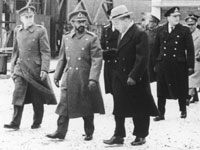 Haile Selassie in Horten
Haile Selassie in Horten
Haile Selassie arrived in Horten on the 10th of October 1954.
He was brought through the town in a car. It was one of the first
winterdays with new, white snow. The schools had closed down and
we all stood along the streets in our best clothes to get a glance
of the Emperor and to wish him welcome. In those days it was quite
a sight.
During the visit he also had a dinner at the Sjømilitære
Samfunn. When he arrived there a lot of people had found their
way to see more of him. He stopped on the stairs and had a speech
to the crowd.
 Haile
Selassie´s
Haile
Selassie´s
signature in the Guestbook
Among the audience there were some children who after a while
wanted to have a closer look. They found a way through the barricades
and guards and came up to the Emperor. He liked this and let them
through. A little girl had picked some flowers and gave to him.
He lifted the girl up and placed her on his arm.
While holding her on the arm and speaking to her, he took some
gold-coins with the portrait of the Emporer printed om it, out
of his pocket and started to give them to the other children,
one by one. Some still have these coins today.
When the time had come to enter the building, the Admiral and
other officers from the Norwegian Navy had to guide the children
into the hall because the Emperor would have it that way. The
Admiral carried the girl.
It rather got out of control. But it was surely a good gesture
from the Emperor.
This is a little glimpse from a very special visit, which we have
learned a lot more about lately.
The reason for that is Reggae music.
We have arranged Festivals in our hometown since 1975.
In 1978 we were lucky and were visited by Bob Marley and the Wailers.
We were rather young at that time and we did not quite understand
this Rastafari-"Thing".
Bob Marley and his band made a change.
|
|
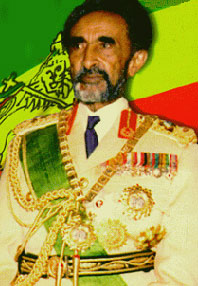
His
Imperial Majesty Haile Selassie
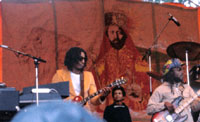
Take
a closer look at the
Bob Marley and the Wailers Backdrop used
on
the Kayatour tour in 1978.
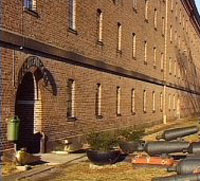
Marine Museum, Horten.
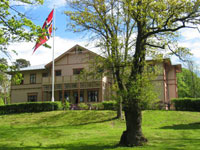
Sjømiltære Samfunn, Horten
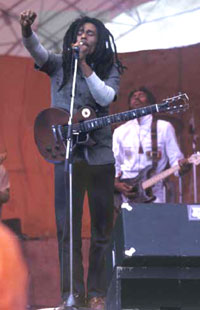
Bob Marley
Hortensfestivalen 1978
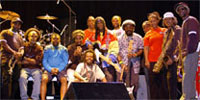
The
Wailers 2004

Article
form Gjengangeren 20. oct 1954
Only
in Norwegian language so far.

Article
form Gjengangeren continued.
Working with a translation
|
|
|
| |
|
|
|
Times They Are A-Changing.
We have found that this visit was important in many ways. We have
learned a lot more about Haile Sallasie, Ethiopia, the Rastafari
Movement, and a lot more about relationships across ethnic borders.
Earlier we had equated reggae music with weed or “bangi”
smoking. Foolishly (like many of our contemporaries) we even concluded
that the “ganja” or “bangi” inhalations
had killed the leader of the “Wailers” band. We have
learned that it was not so.
Today we have learned that no other music is considered as educational
as reggae. Various names have grown out of the food cooked by
Bob Marley and his friends in Jamaica. Especially in Africa, Lucky
Dube (South Africa) Alfa Blondi (Ivory Coast) plus the new generation
of rappers get openly inspired.
We have also learned that there is a lot of Rastafarians that
don´t even smoke or drink alcohol.
We also learned that these were some very kind people who treated
us well. We liked the Reggae music and we enjoyed the company
of the Rastafarians.
The following year we were visited by Peter Tosh. The year after
by Toots and the Maytalls.
Last year we invited The Wailers to come and visit us again, and
they did. That was great.
|
|
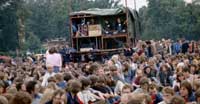
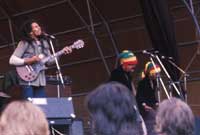
Bob Marley Playlist
Hortensfestivalen
2. juli 1878
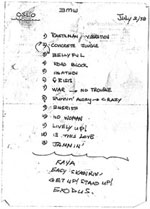

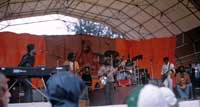
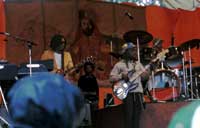

Peter
Tosh Hortensfestivalen 1979
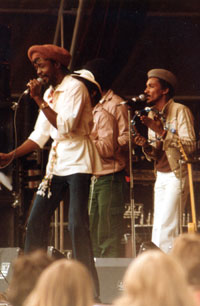
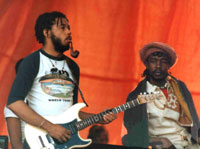
LUCKY
DUBE Roserock 2005
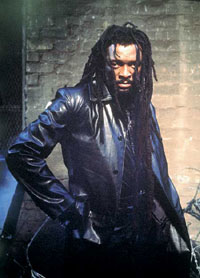
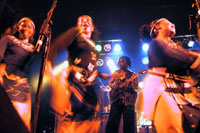
|
|
| |
|
|
We visited the house where Haile Sallasie stayed in 1954 and had
a dinner with the band there.
The
Norwegian Naval Museum is also in Horten, only 200 meters
from Sjømilitære
Samfunn. There they have a special monter for the Emperor.
They also have his old flag.
To day Sjømilitære
Samfunn is a hotel. Its still the same old place, all untouched.
The Emperor had his dinner in the Library. It is still the same
too.
This year we will be visited by Lucky
Dube from south Africa.
Her are some words of Freddy Macha:
Marley’s package was total. It wasn’t merely guitars
and nice tunes. It had a moral driving force: political and educational
messages meshed with the spiritual religion of Rastafarianism.
These beliefs were connected to serious movements and respected
leaders.
Marcus Gavey, who has inspired almost every single black captain
of any significance in the past seventy years (e.g. Steve Biko,
Martin Luther King, Kwame Nkrumah, Malcolm X) was ever present
in the reggae lyrics. At times you even find his poetry in Bob
Marley’s songs.
Check “Who the cap fits” (Rastaman
Vibration, 1975):
“Man to man is so unjust,
People you don’t know who to trust,
Your best friend could be your enemy;
and your worst enemy your best friend…”
And then the link to Africa through Rastafarian religion
in Ethiopia. The fact that teachers in Tanzanian classrooms taught
us Ethiopia was “never colonised” made sense to these
Caribbean artists.
To any African, Haile Sellassie, the king of Ethiopia was a “sell
out” who never cared about the issues affecting the continent.
But to the Rastas he is symbolic.
Marley’s
music glorified Sellassie and as a tribute o-ne of his best songs,
“War” (released at the peak of the Angolan war in
1975-76) highlights the Ethiopian royal leader’s speech
to the United Nations a decade earlier:
“Until the philosophy that creates o-ne race superior
and another inferior;
is finally and permanently,
Abandoned,
Totally destroyed.
There will be war… |
|
|









